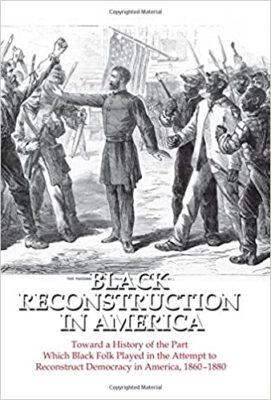So, I recently read W. E. B. Du Bois’s famous 1935 history of the Civil War era, Black Reconstruction in America. Like most leftists, I’ve read a million excerpts from the book over the years. Not to mention many other Du Bois texts – Dusk of Dawn is a personal favorite. But I hadn’t read Black Reconstruction until now. Let’s say a word or two about it.
Black Reconstruction: Marxist or Race-Identitarian?
A recent article on Black Reconstruction in Catalyst motivated me to finally give it a read.
Jeff Goodwin wrote the article to add to an ongoing question over Du Bois’s work: when, exactly, did Du Bois transition from a race–identitarian perspective to a Marxist one? Black Reconstruction plays a central role in this debate. Goodwin reads it as a Marxist text, whereas many others think he hadn’t quite gotten there yet. Just about everyone agrees he got there by the 1940s.
For my part, a couple of things about the book impressed me. First, any reader can appreciate how Du Bois tells the story of Reconstruction. He puts the focus on black southerners and black agency. What was this period like for black Americans? What role did they play in the war and its aftermath? Black Americans weren’t simply passive observers waiting for the “white man” to free them. Du Bois shows this.
At times he takes the theme too far. His claim that a ‘general strike’ among black southerners was the main cause of the North’s victory in the Civil War is almost certainly an overreach. But Du Bois helpfully corrects histories that center the actions and perspectives of whites.
Psychological Wage
Second, I found both readings of Du Bois – Marxist and race-identitarian – in the text. He doesn’t fully join either camp, in my view. Rather, he weaves it all together into something all his own.
Nowhere do we see this more prominently than in Du Bois’s famous passage on the ‘psychological wage’ of whiteness. I’ll lay out an extended version of the quote:
It must be remembered that the white group of laborers, while they received a low wage, were compensated in part by a sort of public and psychological wage. They were given public deference and titles of courtesy because they were white. They were admitted freely with all classes of white people to public functions, public parks, and the best schools. The police were drawn from their ranks, and the courts, dependent upon their votes, treated them with such leniency as to encourage lawlessness. Their vote selected public officials, and while this had small effect upon their economic situation, it had great effect upon their personal treatment and the deference shown them. White schoolhouses were the best in the community, and conspicuously placed, and they cost anywhere from twice to ten times as much per capita as the colored schools.
Most people think this quote proposes race as the fundamental force of the U.S. They think it means white privilege (in one sense) explains the lack of unity among working-class Americans across race.
And, yes, the quote is about race and the role it plays.
Goodwin, on the other hand, thinks the quote does the opposite. He sees Du Bois pointing to the underlying economic causes behind the psychological wage. They thought they were competing with black workers for jobs and therefore wanted to exclude them.
Furthermore, they attained real material benefits from the ‘public and psychological wage’ Du Bois mentions. Not merely symbolic benefits. In the quote, Du Bois speaks of better schools and better jobs. Sure, he dismisses voting as having a ‘small economic effect,’ but that quote applies only to voting, not to the entire system.
For my part, I think both sides in this debate are right. Yes, the quote is about race. But, yes, it’s also about material differences and underlying conflict over jobs and schools. In Black Reconstruction, Du Bois draws no distinction between those stories.
